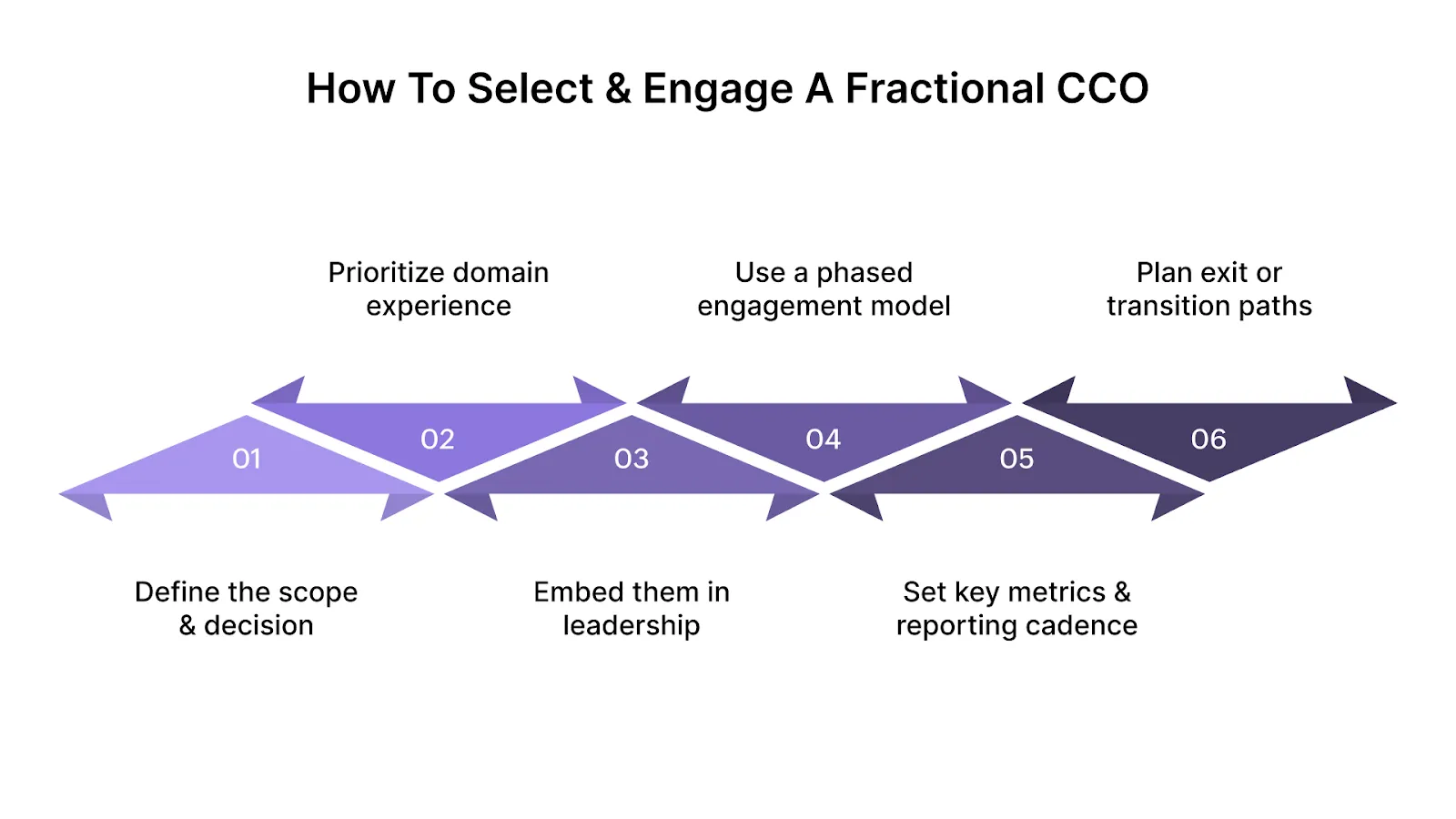Oct 14, 2025
Why Fractional CCOs Are the Smartest Move for Startups

By Fraxtional LLC

When you launched your fintech or embedded finance startup, your mind was on product, growth metrics, hiring, and market fit. Compliance was often relegated to the "later" list. But here's a wake-up call: nearly 73 % of fintech startups fail within three years due to preventable regulatory compliance issues.
Imagine building an elegant product, scaling users, closing investors, and then your bank partner pulls out or your audit flags you. Everything you built is at risk because you couldn't prove you understood risk, control, or compliance. That stress, that uncertainty, is something no founder wants.
In this article, we will explain why a fractional CCO is more than just a cost-effective hire. A fractional CCO anchors your compliance function, preserves your runway, and keeps your growth aligned with what external partners demand.
Quick Take
- 73% of fintech startups fail due to compliance lapses that could have been avoided with early leadership oversight.
- A fractional CCO gives startups executive-level compliance guidance without the full-time cost.
- They assist with bank onboarding, licensing, audits, and investor diligence, ensuring growth remains friction-free.
- Startups see measurable ROI, fewer audit findings, faster remediation, stronger partner trust.
- Fraxtional offers embedded compliance leadership that scales with your business, ensuring you stay ready for regulators, banks, and investors.
The Problem: Why Startups Slip Without a Compliance Leader

Startups often treat compliance as a checkbox to tick later, until it’s too late. In regulated verticals like fintech or embedded finance, this assumption exposes critical vulnerabilities.
Ad hoc compliance is a ticking clock
Founders may plug gaps with legal templates, assign compliance to a generalist, or outsource pieces to freelancers. But regulations evolve, risk shifts, and patchwork solutions crumble under scrutiny.
The real costs of neglect
- Banks or sponsor partners may reject you during diligence.
- Audits will surface control gaps, blocking scaling or partnerships.
- Regulatory enforcement or fines could surface.
- Investors perceive hidden risk, and valuations get hit.
Example: In March 2025, Robinhood Markets settled charges with FINRA for $29.75 million related to failures in supervision and compliance, including deficiencies in anti-money laundering efforts.
Key lessons:
- Regulatory bodies will penalize lapses in supervision, internal controls, and compliance oversight, not just product failures.
- As your startup scales, compliance exposure grows. Without a qualified leader, those exposures may go unnoticed until they become costly.
What a Fractional CCO Does for Startups

A fractional CCO brings executive-level compliance leadership tailored to the needs of early-stage companies. Their goal is to embed structure, accountability, and control without demanding a full-time budget or headcount.
Core roles they assume
1. Designing founder-friendly compliance programs
They build compliance frameworks, policies, controls, processes, that reflect how your startup operates today, but with room to grow.
2. Risk identification & mitigation planning
They map your risks across systems, product features, vendors, and users, then design controls to address those risks.
3. Audit and readiness support
For SOC 2, internal audits, or external reviews, they prepare evidence, respond to auditor questions, and lead remediation.
4. Due diligence & banking/regulator interface
They create diligence decks, respond to compliance questionnaires, and often engage directly with banks or regulators to defend your setup.
5. Training, oversight & reporting
They build training modules, review compliance adherence across teams, and issue regular reports to founders or the board.
What they typically don’t do
- They will not (immediately) replace your full tech, product, or security team. Their role is compliance oversight, not product execution.
- They won’t do unrelated operations tasks (e.g. sales, marketing) unless compliance overlaps.
- They do not “turn compliance on and forget it.” Their engagement expects periodic reviews, updates, and ongoing interaction.
If you’re ready to bring on a compliance leader who plugs into your team (not just advises from the sidelines), connect with Fraxtional today and explore how a fractional CCO can transform risk into confidence.
When to Bring in a Fractional CCO

There are clear moments when adding a startup CCO in a fractional role becomes a smart move. But the real value comes from how they collaborate closely with the CEO and internal teams to elevate the entire organization.
- Before your first funding round
Founders often field diligence questions around risk, compliance, and controls. A fractional CCO works directly with the CEO to shape that narrative. They prepare documents, walkthroughs, and control evidence so the CEO can confidently present compliance maturity to investors.
- Onboarding a bank or sponsor
Compliance is frequently a gating factor in bank relationships. The fractional CCO supports CEO calls, answers bank diligence, and ensures internal teams (engineering, ops, legal) speak a consistent compliance language. They coordinate between product, finance, and legal to close the gaps that reviewers will flag.
- Entering regulated verticals or applying for licenses
When you extend into payments, crypto, lending, or remittance, you need regulatory filings, AML/KYC frameworks, and audit readiness. The fractional CCO becomes a bridge between the CEO's vision and the teams responsible for execution, ensuring that your product roadmap, engineering, and compliance flows align.
- Audit or review preparations
Auditors and reviewers demand evidence, traceability, and control discipline. The fractional CCO organizes documentation, oversees control testing, and works with teams to plug gaps.
- Rapid scaling or expansion across markets
As transaction volume and geography increase, exposures multiply. The fractional CCO works with leadership to flag risk areas, adjust policies, and integrate compliance into growth plans.
Once you’ve identified the right moment to bring in fractional compliance leadership, the next challenge is choosing the right fit.
Suggested read: Is an Outsourced Chief Compliance Officer Right for You?
How to Select & Engage a Fractional CCO
Choosing the right fractional CCO and structuring the engagement correctly determines whether compliance becomes a strength or a liability.

1. Define the scope & decision rights up front
Start with clarity: decide which compliance domains (AML/KYC, audits, licensing, vendor risk, policy, etc.) the CCO will own. Define who on your team the CCO has authority over, who they report to (e.g., CEO, board), and decision thresholds (e.g., when to escalate).
2. Prioritize domain experience
Look for candidates who understand your vertical (fintech, crypto, embedded finance). Someone who's worked with banks, licensing, audits, or regulators brings immediately applicable mental models and shortcuts.
3. Embed them in leadership & cross-functional teams
The CCO should not be a distant consultant. They must join product, ops, legal, and finance meetings. That alignment ensures compliance is lived, not tacked on.
4. Use a phased engagement model
Begin with audit & gap assessment, remediation & control design, ongoing oversight. That allows you to calibrate and scale the commitment gradually.
5. Set key metrics & reporting cadence
Define 3–5 core KPIs (e.g., number of audit findings, time to close remediation, control coverage, compliance maturity score). Agree on weekly or monthly reporting to founders/board.
6. Plan exit or transition paths
Over time, your needs change. Build in a mechanism to transition from fractional to full-time if necessary. Also, define conditions to scale down or shift scope if business priorities change.
Hiring a fractional CCO is a strategic investment, but like any investment, it should show measurable outcomes.
Suggested read: Understanding Fractional CRO for Strategic Growth
ROI Indicators for Your Fractional Compliance Investment
A fractional CCO is not just a cost center. You need clear metrics and reporting to show the business value. Here are practical ways to measure their impact and demonstrate ROI to your leadership or investors.
Many firms claim to offer compliance leadership, but few deliver results that compound over time. Fraxtional stands apart because its model isn’t built on checklists, it’s built on partnership, embedded leadership, and outcomes founders can measure.
Why Fraxtional Makes a Real Difference as Your Fractional CCO Partner

When your startup is navigating risk, compliance, and scaling pressures, you don't need a vendor, you need a co-pilot. Fraxtional is built to do more than consult: it embeds senior compliance leadership into your operations, aligning risk controls with growth ambitions.
- Embedded accountability, not advisory noise
A Fraxtional director doesn't sit on the sidelines. They join leadership syncs, sit in on product, ops, and legal calls, and take ownership of bank diligence, audit prep, and regulatory correspondence.
- Comprehensive coverage under one roof
You don't have to manage multiple consultants or patchwork vendors. Fraxtional handles licensing, AML/KYC, policy frameworks, SOC 2 readiness, audits, vendor risk, and bank interface, all coordinated by a single leader.
- Built for your stage
Early on, the focus might be compliance audits and policy design. Later, it shifts to oversight, control testing, and scaling controls across jurisdictions.
- Transparency through measurable outcomes
From day one, Fraxtional works with you to define metrics such as closed audit findings, remediation times, policy coverage, and control maturity. Regular reporting ensures you see the value, not just progress behind the scenes.
- Credibility you can present confidently
When you bring Fraxtional to due diligence, integration, or licensing discussions, you're not introducing "just another consultant." You get a named senior compliance executive, someone banks, regulators, and investors can evaluate seriously.
Conclusion
For startups in fintech, crypto, or embedded finance, compliance leadership is no longer optional. It's what builds trust with banks, accelerates funding, and prevents avoidable setbacks. A fractional startup CCO gives you that leadership before you can afford it full-time, and the difference shows up in every audit, investor meeting, and integration you complete smoothly.
Fraxtional helps startups get there, fast and confidently. Their directors act as part of your team, bringing hands-on expertise in risk, licensing, SOC 2, AML, and bank partnerships. They don't slow growth; they make it sustainable.
If you're serious about scaling with confidence, start with Fraxtional. Talk to a Fraxtional Director today!
FAQs
As soon as you start moving customer funds, integrating with banks, or preparing for a funding round. Early involvement prevents costly remediation later.
Most startups engage a fractional CCO for 20–60 hours per month, scaling up or down depending on audit cycles and growth pace.
They run a quick compliance gap assessment, then create a 90-day plan focused on immediate risks and long-term structure.
Yes. They prepare diligence documents, respond to questionnaires, and often join calls with banks or regulators directly.
No. They integrate with your product and ops functions, ensuring compliance fits naturally into your build and release cycles.
blogs
Don’t miss these
Let’s Get Started
Ready to Strengthen Your Compliance Program?
Take the next step towards expert compliance solutions. Connect with us today.




